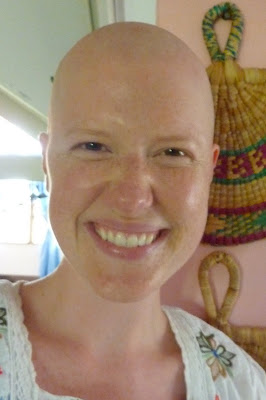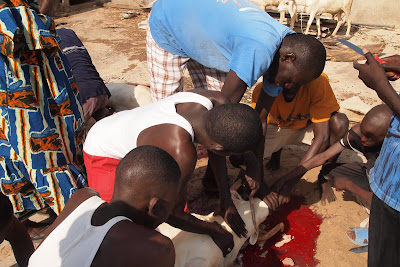Let’s Restore our Land
The interns arrived this week, which has completely changed the tone of the Beersheba Project (www.beershebaproject.org); in fact, the presence of the 14 interns, who will learn about agriculture and work the land during one year’s time, has actually completed the tone. The three couples that started this project had a vision to help the surrounding churches take part in restoring the deforested land of Senegal while spreading the Gospel of Jesus Christ. For more than one year, they had been in the preparation stages of working the farm and searching for possible partners in their effort. Finally, all the pieces had come together, and they decided that the time was right for them to welcome their first batch of interns.
Building a temporary hut, until the dorm rooms are finished, out of materials found on the Beersheba property, for two of the students who are married.
With the extra many sets of hands to do the manual labor a farm necessitates, I was made a little superfluous; however, I was given a great task to complete, which I took most seriously during my last week with the Beersheba Project. They asked me if I would be interested in translating a book called Let’s Restore our Land, which is a book that discusses the right way—God’s way—of taking care of the land and cultivating in a manner that makes the land more productive over the years as opposed to depleted and infertile after series of continuous planting and working of the soil. The book is an easy read and quite a pleasure to translate. I wish I were a faster translator, but I am learning new French words in the process and improving my fluency; I have absorbed many new phrases, deepening my appreciation for French and for farming.
Today, the interns each planted his own tree as a symbolic participation in the vision that is the Beersheba Project: re-invest in making the land productive and shine God’s light before men that they might give glory to Jesus and praise their Creator. When planting a tree in clay-hardened soil—the type of soil Beersheba has—one must dig twice as wide and twice as deep the size of the bag in which the baby tree has been grown in the nursery. That way, the roots can uncoil and have plenty of room to stretch and become stronger as they grow. I simply love trees and love how they truly do help to restore the land and can be both a symbol and a tool to spread Jesus’ love to others and to make this earth a little better for the future generations.
My Sandiara family
My housemates and friends
Tip #14 for Surviving in Senegal: When in an unfamiliar locale, find a friendly local to help you navigate your trajectory. This past weekend, I was traveling back home from Mbour to Sandiara, where I was living in Beersheba’s guesthouse, and it was about 8 pm. Normally, public transportation runs late, and one never has trouble finding some bus or big white van to go where desired. This night, however, I waited in one white van for about 30 minutes until I was forced to get down because there were not enough passengers. I asked one of my fellow passengers what was happening and where he was going. Fortunately, he was on his way to Sandiara and let me tag along as we both tried to exit Mbour. He paid for a taxi to take us to the outskirts of town, where he was able to haggle the price of a ticket on a bus headed past Sandiara. I was certainly thankful for his assistance! Who knows how I would have gotten home. Thank God for all the people he puts in my life to keep me safe and sound as I explore this fascinating world he has created.
Ngourban, a local millet stew made with dried fish of which I am quite fond










Comments